
Metodi Kanev On Social Reality, Theory and Economics Education /3 Antonio V. Dichev Discriminative Ability in Estimating Probability of Default with Certain Machine Learning Algorithms /16 Yordan S. Yordanov Possibilities for Overcoming Issues in the Phase of Old-Age Pension Payments from an Universal Pension Fund /28 Ventsislav Dikov Intellectual Capital and Market Capitalization of Public Companies /46 Andrey Zahariev, Atanas Atanasov, Galina Chipriyanova Finance and Economic Accounting – Faculties, Scientific Research and a 70-Year Tradition /66

The article is an attempt to defend the based on the Seneca’s maxim thesis that the present is to fix the past and foresee the future. Employing a broader socio-economic paradigm, it analyses the essence of societal reality and economic reality in particular; the ...

The article highlights the importance and added value of some machine learning algorithms in assessing default probability. The results of the research highlight the discriminative ability added to many other essential aspects of machine learning in assessing credit ...

The structuring of the pension model, the exploration of its characteristics and parameters, as well as of pension products, their role, and the potential to ensure long-term social security in an environment marked by socio-economic and demographic challenges, is a ...

Value creation is the main goal of economic agents operating in capital markets. The subject of research are the intangible fixed assets reflecting the intellectual capital of companies. The object of the article are some current issues regarding the assessment of the ...

At a solemn joint session, the Faculty Councils of the Faculty of Finance and the Faculty of Economic Accounting at the D.A. Tsenov Academy of Economics celebrated the 70th anniversary of their establishment. By Decree No. 289 of August 20, 1953, effective from ...

"Economic Archive" is the first academic economic journal in Bulgaria. From 1st of January 2017 the English language title of the journal is changed from “Narodnostopanski archiv” (transliterated from Bulgarian) to “Economic Archive”. The decision to be issued under the name "Narodostopanski archiv" (changed to "Narodnostopanski archiv", now “Economic Archive”) was taken at a meeting of the Academic Council of October 1st 1945 (recorded in Protocol ¹ 100). A quarterly period of issue was

Requirements for submission of papers for "Economic Archive" journal.
1. Number of pages: minimum - 12 pages;
maximum - 20 pages.
2. Submission of papers:
a printout (paper) and an electronic version(CD);
abstracts of half a page;
Card of the author (s) with E-mail and GSM.
3. Technical specifications:
Word 7.0 (minimum);
page size A4, 29-31 lines and 60-65 characters per line;
font -
„Economic Archive“ journal is a scientific economic periodical of D. A.Tsenov Academy of Economics- Svishtov. In Book 1 of 1946, in the editorial of Prof. Todor Vladigerov, the foundations of the editorial policy of the journal were laid: "... to discuss and propose solutions to current problems of the economy ...".
The journal is published in four books a year.
In 2009, the Journal launched its international issue in English, in which the translations of the leading publishing articles from the previous year were presented. Since 2013 the journal has been published as a bilingual edition (in Bulgarian and English). Since 2014 the journal has been freely accessible and available on the Internet (http://www2.uni-svishtov.bg/nsarhiv/).
The Currency Board in Bulgaria: Theoretical Reflections and Empirical Results
Via this article the authors would like to discuss the idea of the inter-section point of theoretical reflections and reported empirical results referring to the currency board in Bulgaria. To achieve the goal defined the article is structured in the following separate sections: first, clarification of the concept of a currency board in light of leading theoretical research; second, critical analysis and evaluation of the characteristics of the currency board in Bulgaria; third, justification ...
FUTURE EURO AREA MEMBERSHIP OF BULGARIA IN TERMS OF THE BUSINESS CYCLE
In the present paper, vector autoregression (VAR) is used to assess the extent to which Bulgaria’s economic cycle is synchronized with the one of the euro area (EA). The main fiscal and monetary factors affecting the coordination of the business cycles of Bulgaria and the EA are identified. Recommendations for macroeconomic policies are formulated to support the synchronization of Bulgaria’s economic cycle with the one of the EA and to prepare our country for the adoption of the euro. ...
A New Yuan or a New Monetary System
The research area of the present study is the Chinese yuan (renminbi). The research subject is the evolution of the Chinese yuan from a national to a global reserve currency. The paper tests the proposition that the rise of the Chinese currency is a sign of deep and qualitative changes in the international monetary system. The aim of the study is to analyse and track the evolution in the current situation in the international monetary system, in order to highlight the factors and the reasons ...